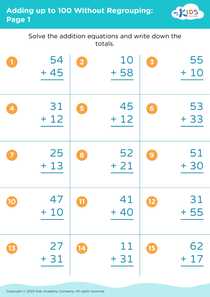Fine Motor Skills Adding up to 100 with Regrouping Worksheets for Ages 6-8
3 filtered results
-
From - To
Enhance your child's fine motor skills while they delve into the exciting world of math with our "Adding Up to 100 with Regrouping Worksheets" designed for ages 6-8. These engaging worksheets provide a hands-on approach to learning addition, incorporating fun activities that strengthen dexterity and hand-eye coordination. As children work through various addition problems, they will not only master regrouping but also develop essential motor skills crucial for writing and everyday tasks. Perfect for at-home or classroom use, these resources are an excellent way to build confidence in young learners. Click to explore our vibrant, interactive worksheets today!
Fine motor skills are essential for children aged 6-8 as they significantly influence a child’s ability to perform tasks that require precision and control, such as writing, cutting, and using tools. The development of these skills is intimately tied to their academic progress, especially in math, where understanding concepts like regrouping and addition requires fine coordination.
When children add numbers that require regrouping—such as 57 + 46—they engage in complex cognitive processes. This not only enhances their mathematical understanding but also demands controlled finger movements. If fine motor skills are underdeveloped, children may struggle with manipulating their tools (like pencils and erasers) effectively, which can result in frustration and lower academic performance.
Moreover, fine motor tasks also promote concentration, perseverance, and problem-solving abilities, essential traits for long-term success. These skills assist children in following through complex steps in addition, while also fostering independence in everyday activities. Parents and teachers, therefore, should prioritize the support of fine motor skill development through engaging activities like cutting papers, threading beads, or even playful games. By nurturing these skills, adults can equip children with the tools they need for both academic achievement and everyday life.



















